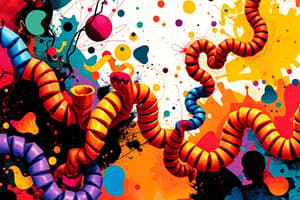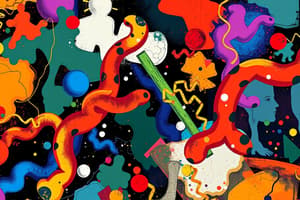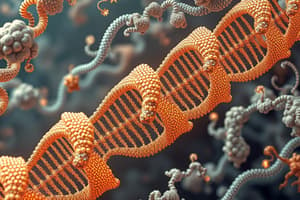Podcast
Questions and Answers
What condition is characterized by the loss of proteins when plasma proteins exit the vascular system?
What condition is characterized by the loss of proteins when plasma proteins exit the vascular system?
In protein-losing gastroenteropathy, where do the lost proteins go?
In protein-losing gastroenteropathy, where do the lost proteins go?
Which system experiences the direct loss of proteins in cases of protein-losing gastroenteropathy?
Which system experiences the direct loss of proteins in cases of protein-losing gastroenteropathy?
What is primarily affected in diseases associated with protein-losing gastroenteropathy?
What is primarily affected in diseases associated with protein-losing gastroenteropathy?
Signup and view all the answers
Which of the following best describes the process occurring in protein-losing gastroenteropathy?
Which of the following best describes the process occurring in protein-losing gastroenteropathy?
Signup and view all the answers
What condition is associated with loss of plasma proteins due to gaps between the lining cells of the gastrointestinal tract?
What condition is associated with loss of plasma proteins due to gaps between the lining cells of the gastrointestinal tract?
Signup and view all the answers
Which of the following best describes the mechanism behind protein loss in protein-losing gastroenteropathy?
Which of the following best describes the mechanism behind protein loss in protein-losing gastroenteropathy?
Signup and view all the answers
Which of the following diseases could lead to protein loss through the gastrointestinal system?
Which of the following diseases could lead to protein loss through the gastrointestinal system?
Signup and view all the answers
What is indicated when a mutation is found in more than 1% of a population?
What is indicated when a mutation is found in more than 1% of a population?
Signup and view all the answers
Why is the phenomenon of protein leakage significant in the diagnosis of gastrointestinal diseases?
Why is the phenomenon of protein leakage significant in the diagnosis of gastrointestinal diseases?
Signup and view all the answers
What happens to a mutation when it is passed down to offspring across generations?
What happens to a mutation when it is passed down to offspring across generations?
Signup and view all the answers
In protein-losing gastroenteropathy, what is primarily affected due to the leakage of plasma proteins?
In protein-losing gastroenteropathy, what is primarily affected due to the leakage of plasma proteins?
Signup and view all the answers
Which term refers to genetic variations occurring frequently within a population?
Which term refers to genetic variations occurring frequently within a population?
Signup and view all the answers
How can a mutation spread through a population?
How can a mutation spread through a population?
Signup and view all the answers
What is NOT true about mutations in a population?
What is NOT true about mutations in a population?
Signup and view all the answers
What defines a mendelian or monogenic trait in a population?
What defines a mendelian or monogenic trait in a population?
Signup and view all the answers
Which of the following statements about polymorphism is true?
Which of the following statements about polymorphism is true?
Signup and view all the answers
What is a common technique used to study proteins?
What is a common technique used to study proteins?
Signup and view all the answers
What is a shared characteristic of plasma proteins?
What is a shared characteristic of plasma proteins?
Signup and view all the answers
Which of the following best describes electrophoresis?
Which of the following best describes electrophoresis?
Signup and view all the answers
What condition is caused by bilirubin accumulation in the brain due to the underdeveloped blood-brain barrier in newborns?
What condition is caused by bilirubin accumulation in the brain due to the underdeveloped blood-brain barrier in newborns?
Signup and view all the answers
Why are newborns particularly susceptible to kernicterus?
Why are newborns particularly susceptible to kernicterus?
Signup and view all the answers
What is bilirubin?
What is bilirubin?
Signup and view all the answers
Which of the following is NOT a potential effect of bilirubin accumulation in the brain in newborns?
Which of the following is NOT a potential effect of bilirubin accumulation in the brain in newborns?
Signup and view all the answers
What might be a significant risk factor for kernicterus in infants?
What might be a significant risk factor for kernicterus in infants?
Signup and view all the answers
What condition results from the brain's inability to remove bilirubin?
What condition results from the brain's inability to remove bilirubin?
Signup and view all the answers
Why should aspirin not be given to infants?
Why should aspirin not be given to infants?
Signup and view all the answers
The accumulation of bilirubin can lead to which severe neurological condition?
The accumulation of bilirubin can lead to which severe neurological condition?
Signup and view all the answers
What is the underlying problem causing mental retardation in Reye’s syndrome?
What is the underlying problem causing mental retardation in Reye’s syndrome?
Signup and view all the answers
What is a significant risk factor for the development of kernicterus in infants?
What is a significant risk factor for the development of kernicterus in infants?
Signup and view all the answers
Flashcards
Protein-losing gastroenteropathy
Protein-losing gastroenteropathy
A condition where proteins from the blood leak into the digestive system.
Gastrointestinal (GI) tract
Gastrointestinal (GI) tract
The system of organs responsible for digesting food and absorbing nutrients.
Plasma
Plasma
The fluid portion of the blood, containing proteins.
Plasma proteins
Plasma proteins
Signup and view all the flashcards
Plasma proteins exit the vascular system
Plasma proteins exit the vascular system
Signup and view all the flashcards
Tight junctions
Tight junctions
Signup and view all the flashcards
How tight junctions affect protein loss
How tight junctions affect protein loss
Signup and view all the flashcards
Protein loss in the stool
Protein loss in the stool
Signup and view all the flashcards
Consequences of low protein levels
Consequences of low protein levels
Signup and view all the flashcards
Mutation
Mutation
Signup and view all the flashcards
Inheritance
Inheritance
Signup and view all the flashcards
Polymorphism
Polymorphism
Signup and view all the flashcards
Mutation spread
Mutation spread
Signup and view all the flashcards
Mutation transmission
Mutation transmission
Signup and view all the flashcards
Kernicterus
Kernicterus
Signup and view all the flashcards
Blood-brain barrier
Blood-brain barrier
Signup and view all the flashcards
Bilirubin
Bilirubin
Signup and view all the flashcards
Bilirubin Buildup in Brain Cells
Bilirubin Buildup in Brain Cells
Signup and view all the flashcards
Why newborns are susceptible to kernicterus
Why newborns are susceptible to kernicterus
Signup and view all the flashcards
Reye's Syndrome
Reye's Syndrome
Signup and view all the flashcards
Albumin
Albumin
Signup and view all the flashcards
Aspirin & Bilirubin Competition
Aspirin & Bilirubin Competition
Signup and view all the flashcards
Mendelian trait
Mendelian trait
Signup and view all the flashcards
Electrophoresis/Isoelectric Focusing
Electrophoresis/Isoelectric Focusing
Signup and view all the flashcards
Fluid balance
Fluid balance
Signup and view all the flashcards
Transport
Transport
Signup and view all the flashcards
Immune defense
Immune defense
Signup and view all the flashcards
Study Notes
Biochemistry - Plasma Proteins
- Plasma proteins, primarily albumin and globulins, are synthesized in the liver.
- Immunoglobulins (gamma globulins) are produced by mature B lymphocytes in bone marrow, spleen, and lymph nodes.
- Plasma proteins are initially synthesized as preproproteins (immature forms).
Why this preproprotein form?
- Preproproteins are inactive forms, protecting the synthesizing tissues (e.g., enzymes).
- If always active, these proteins could harm the cell where they are produced.
Preproproteins and Proproteins
- Preproproteins require two signal processes for maturation.
- Proproteins require only one signal process.
- Both go through post-translational modifications after initial synthesis.
Post-Translational Modifications and Time
- Proteins need different times for synthesis and release into the plasma membrane, from 30 minutes to several hours.
- Most are glycoproteins (N- or O-linked), except for albumin.
Plasma Protein Polymorphism and Half-Lives
- Plasma proteins exhibit polymorphism, meaning they have various forms.
- Their half-lives vary, determined by protein type and function.
- Half-life can change when the protein binds to other molecules.
Half-Life and Diseases
- Diseases affecting the gastrointestinal tract (protein-losing gastroenteropathy) can reduce the half-lives of plasma proteins like albumin, as proteins leak from blood vessels into the GI tract.
- Examples, in Crohn's disease, the half-life of albumin can be reduced by a day.
Protein Mutations and Polymorphism
- Mutations in protein gene sequences can affect protein function (positive, negative, or neutral effects).
- A mutation that becomes common in a population (above 1%) is called a polymorphism.
- Polymorphisms affect many plasma proteins, including alpha 1-antitrypsin, haptoglobin, transferrin, ceruplasmin, and immunoglobulins.
- ABO blood grouping is a well-known example of polymorphism.
- Polymorphism doesn't guarantee disease.
General Functions of Plasma Proteins
- Nutritive role: Broken down for energy.
- pH maintenance: Act as buffers (contain amino and carboxyl groups).
- Viscosity: Contribute to blood thickness and flow.
- Osmotic pressure: Help maintain water balance.
Specific Plasma Protein Functions
- Enzymes: Renin, coagulation factors, lipases.
- Immune response: Immunoglobulins.
- Coagulation: Factors involved in blood clotting.
- Hormonal: Erythropoietin.
- Transport: Transferrin, thyroxine-binding globulin, apolipoproteins.
Starling Forces
- Proteins are retained in the vascular system.
- Blood pressure pushes water out of vessels, while proteins retain it.
- Osmotic pressure exerted by proteins helps maintain fluid balance.
Acute-Phase Proteins
- Their concentration rapidly increases during inflammation, tissue injury, or cancer.
- Examples: C-reactive protein (CRP), alpha 1-antitrypsin, haptoglobin, fibrinogen.
Negative Acute-Phase Proteins
- Their concentration decreases during inflammation, compared to normal and inflammatory conditions
- Examples: pre-albumin, albumin, transferrin.
Albumin
- Major plasma protein (high concentration, 69 kDa).
- Synthesized in the liver (preproprotein).
- 20-day half-life.
- Critical role in osmotic pressure maintenance.
- Binds various molecules (free fatty acids, steroids, bilirubin, metals).
- Has binding sites that can lead to drug-drug interactions.
Clinical Disorders related to Albumin
- Hypoalbuminemia: Low albumin levels, cause edema and various other health problems.
- Hyperalbuminemia: High albumin levels, results from conditions like dehydration.
- Analbuminemia: Genetic absence of albumin production.
- Bilirubin Toxicity and Aspirin: Aspirin and bilirubin compete for binding sites on albumin, leading to jaundice and potentially harming the brain, particularly in newborns.
- Phenytoin-Dicoumarol interaction: These two drugs bind to similar albumin sites, causing interaction.
Studying That Suits You
Use AI to generate personalized quizzes and flashcards to suit your learning preferences.
Related Documents
Description
Test your knowledge on protein-losing gastroenteropathy, its mechanisms, and associated conditions. This quiz covers the loss of proteins, the gastrointestinal tract's role, and the implications for diagnosis. Challenge yourself with questions that delve into the physiological aspects of this condition.




